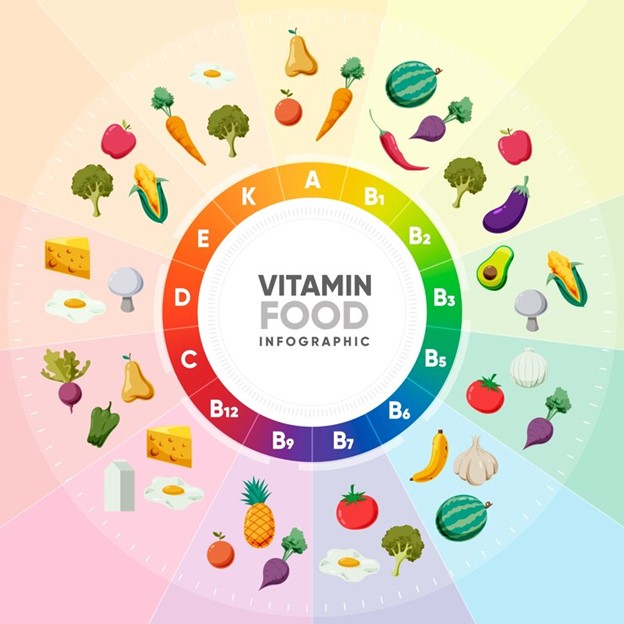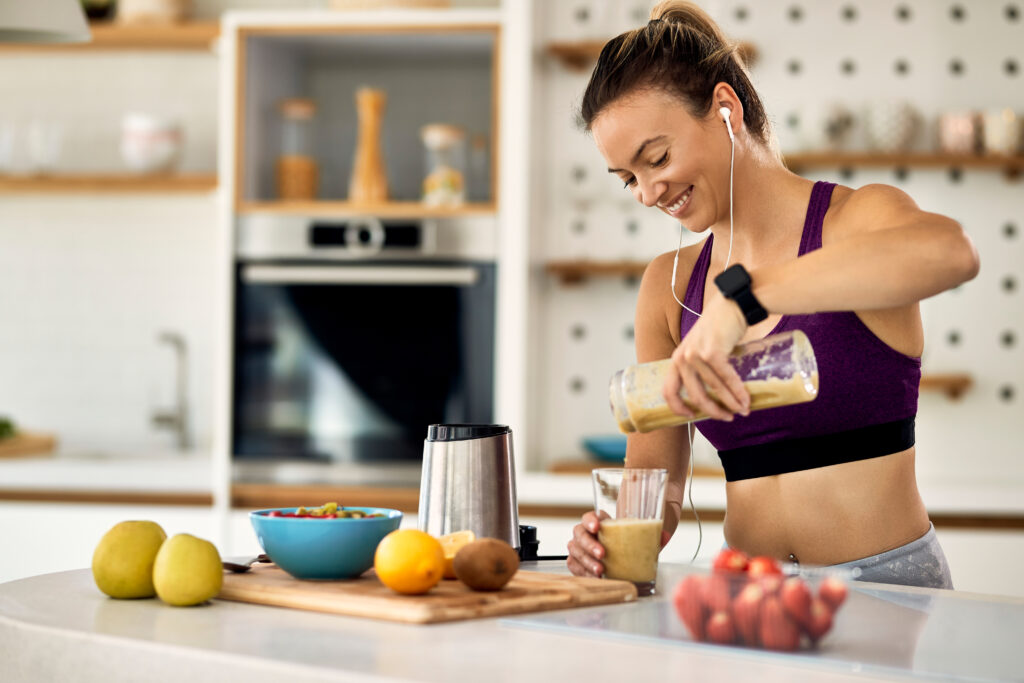Nutrition is crucial for enhancing power, reducing fatigue, increasing recovery, and fostering optimal health. India has a successful sports history, sending athletes to every Summer Olympic Games since 1920. Several factors, including sport type, training intensity, age, and lifestyle, can impact the energy, macronutrient, micronutrient, and fluid requirements of athletes. By meeting these requirements, athletes can optimize performance and minimize the risk of illness or injury.
Source of Energy
An appropriate intake of calories is essential to sustain physical activity and general exercise needs so that sports training and performance can be successful. Inadequate calorie intake can hinder power, endurance, and muscle mass gains and may increase the risk of illness or injury. The calories come from foods with a high proportion of key macronutrients, carbohydrates, proteins and fats. The body is dependent on ATP(adenosine triphosphate) at the cellular level.
The body cannot store enough ATP to support all levels of training, three systems are utilized as sources of energy:
- Immediate Energy
- A Glycolytic Energy System is intended for sports like weight lifting, intense boxing, mixed martial arts, tennis and intermittent high-intensity teams.
- Aerobic metabolism is a source of fuel for endurance sports like running, swimming and cycling. The number of calories, carbohydrates, fats, and proteins utilized during exercise varies based on several factors. These include the duration, intensity, type, and frequency of the workout, as well as the individual’s age, gender, dietary intake, fitness level, stress and sleep status, and genetics. It’s important to note that all three energy systems are engaged at some point during training.
Sports Nutrition and Performance
The primary source of energy for sports nutrition is proteins, carbohydrates and Fats. There is a need to take into account other aspects of health as vitamins and minerals play an important role in metabolism. Water is a vital source of nutrition in quantities greater than what the human body can produce. It’s loaded with nutrients and plays an important role in regulating the temperature as well as providing components for shock absorption and lubrication.
Carbohydrates

- A major source of energy during training.
- A minimum of 3-5g+/kg/day for light activities to 8-12g/kg/day for high-level athletes training 4-5 hours daily is recommended.
- Foods like rice, bread, roti (chapati/naan etc.), millet products, breakfast items such as idli, dosa, dhokla, upma, poha etc., noodles, vermicelli, pasta, fruits, starchy vegetables such as potatoes, carrots, colocasia, yam, plantain and other locally available roots and tubers.
- The minerals and fibre in whole grains make them a good source of nutrients that help keep you feeling full and satisfied with your digestion.
- Quick energy simple sugars geared towards training and competition are sports beverages, bars and sports fuels such as energy chews.
- Deficiency, a compromised immune system and overtraining syndrome may result from inadequate carbohydrates.
Protein

- Essential for recovery, strength, and endurance. About 1.2-2.0 g of protein/kg of body weight per day is recommended.
- Good sources of protein include lean red meat, chicken, fish, eggs, soybean products such as tofu & meal maker (dried soy protein chunks), low-fat milk, curd (Indian yoghurt), paneer (Indian cottage cheese), processed cheese, lentils, dals, sattu (roasted chickpea powder), whole wheat-based products (with 13-14% protein per 100g.)
- Some millets have protein content as high as whole wheat (sorghum, pearl millet, foxtail millet, barnyard millet, and proso millet.)
Fats

- For long-term energy consumption, it is necessary to have a sufficient fat intake of 0.5 to 1.5 g per kg bodyweight each day.
- The following healthy fats are considered to be higher in the essential Omega 3 and Omega 6 fats. Nuts: almonds, cashews, walnuts, peanuts; Seeds: melon, sunflower, flax, sesame; Cooking oils: peanut, mustard, coconut, sunflower oil, sesame oil, rice bran oil, soybean oil, flaxseed oil; and more Saturated fats(dairy based): butter, ghee, high-fat cheeses, paneer. Too much fat can interfere with your body’s performance and health.
- Do not allow trans fat found in baking products such as cookies, biscuits, pastries and puffs. Deep fried snacks: pakodas, samosas and kachori. Deep fried breakfast/meals: poori, vada. Deep-fried sweets. Fast foods: fries, chips, buttered popcorn, deep-fried nuts and creamy additions to make dishes rich in sweet cream, and sour cream.
- The consumption of a high-fat diet during training and before competition can affect body shape, weight and stamina, and cause gastrointestinal problems, such as gas and cramps and poor performance.
Vitamins and Minerals

- An essential component of optimal performance and health, which is often difficult for athletes to achieve through diet alone, due to the balance of training and lifestyle schedules, school, work, family, eating on the run, insufficient fluid intake, and intake of less nutritious easy to prepare or street food consumed on the run.
- Higher-level athletes and heavy sweaters also have concerns about the loss of electrolytes in sweat during training and competition. Electrolytes like sodium chloride, potassium, and magnesium can be substituted by a variety of whole foods, vegetables, and dairy products.
- Vitamins, minerals and electrolytes may also help to meet your dietary needs if salt is used at mealtime or when you are drinking sports drinks as well as energy bars.
- Balanced eating, including a variety of fruits and vegetables, is the best way to guarantee that you get sufficient vitamins and minerals.
- Women athletes should ensure they are getting the right amount of iron from lean red meat, spinach, kidney beans and calcium found in most dairy products.
- Iron-rich foods: pearl millet, barnyard millet, spinach, amaranth leaves, mustard leaves, sorrel leaves, and many other locally available leafy greens.
- Calcium-rich foods: milk, curd (Indian yoghurt), paneer, finger millet, lentils, dals, amaranth seeds, and amaranth leaves.
Pre-Game Fuel(1-4 hour prior)
- You should avoid spices, greasy food and large amounts of fibre.
- Too much proteins, fats or fibres can cause stomach distress.
- Pre-competition meals might include: Rice with simple dal and vegetables, roti/chapatti with dal and vegetables, roti with egg or paneer burji (scramble), rice or roti with chole/rajma/chana (beans) idli-sambar (thin lentil soup), acai (crepe with rice and lentils), puttu (rice and coconut steamed) with kadala Kari (black chickpeas) (only if used to eating them regularly)
- Two to three hours before starting your workout, drink between 14 and 22oz of water or sports drinks.
- Try not to experiment with new food on the day of your performance.
Food During Competition
- Carbohydrates such as fruit slices, ice pops, sports drinks, crackers, pretzels or dried cereals, and biscuits. Indian cookie bars or gels, cereal and chocolate bars are easier to digest.
- During breaks or time out, eat a little bit of food.
- For the prevention of dehydration, drink 6 to 12 ounces of fluid every 15 to 20 minutes as tolerated.
- Competition foods may include Fruits: banana, apple, mango slices; Dry fruits: dates, raisins, figs; Til Laddoo: made with sesame seeds and jaggery, usually the size of a large cherry; Murmura Laddu: made with puffed rice and jaggery, usually the size of table tennis ball.
Post-Game Food
- It’s a good time for you to start recovery and rehabilitation ahead of your next workout. You do not go hungry!
- The window of 30 minutes after training and competition is the optimal time to accelerate recovery, diminish muscle breakdown(catabolism) and enhance muscle build-up (anabolism) with a combination of a high protein, high carbohydrate snack.
- Foods with fluids can also replace the water lost through perspiration. Try tender coconut water, salted lassi to replenish electrolytes, mango lassi, chocolate or badam milk in tetra packs easy, portable, and shelf safe. Dried Fruit Laddu: nuts, seeds, dates, raisins, honey; portable, nutrient-dense, and can be homemade. Instant Shake Mixes: millets and malted grain powders are added to water to make instant drinks.
- For each pound of body weight that has decreased during exercise, supplement with 16 to 24 ounces of fluid.
Conclusion
- Finally, it is necessary to recognise that there are differences in our nutritional needs as regards sports nutrition for athletes between countries. Making the right nutrition choices that meet individual needs is fundamental, and a balanced approach between traditional wisdom and contemporary science can assist us in maximising our performance.
- Let’s not forget that the role of micronutrients, hydration and recovery strategies must always be taken into account concerning macronutrients like carbohydrates, proteins and fats. A treasure chest of options for satisfying these needs is available within India’s rich cuisine, which ranges from nutrient-dense beans and lentils to colourful varieties of fruits and vegetables.
- By taking advantage of synergies between our history as cooks and the new knowledge in nutrition. And you’ve got to get going again, take care of yourselves, recover well, and see your performance go up to a new height on the world stage.


